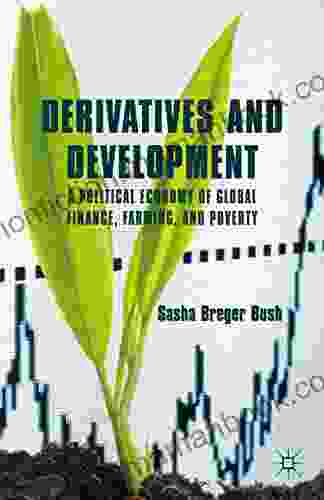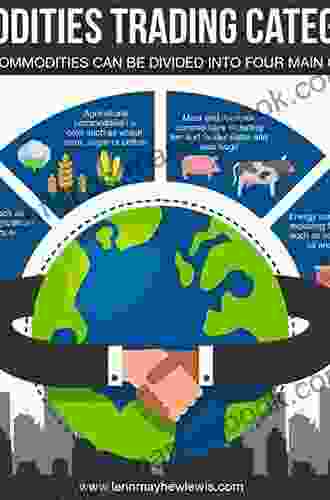Global Markets, Commodity Trade, and the Elusive Promise of Development: A Comprehensive Analysis

The global commodities market plays a crucial role in the economic development of many countries, particularly developing economies. Commodities, such as oil, gas, minerals, and agricultural products, constitute a significant portion of export earnings for these countries and can provide vital revenue for government budgets and investment in infrastructure and social services.
4.8 out of 5
| Language | : | English |
| File size | : | 5035 KB |
| Text-to-Speech | : | Enabled |
| Screen Reader | : | Supported |
| Enhanced typesetting | : | Enabled |
| Word Wise | : | Enabled |
| Print length | : | 321 pages |
However, the relationship between commodity trade and development is complex and often fraught with challenges. This article will explore the dynamics of the global commodities market, its impact on developing economies, and the ongoing challenges in achieving sustainable development in resource-dependent countries.
The Global Commodities Market
The global commodities market is a vast and interconnected network of buyers, sellers, and intermediaries that trade raw materials and primary products. These commodities are used as inputs for a wide range of industries, including manufacturing, construction, and energy production.
The prices of commodities are influenced by a variety of factors, including global supply and demand, geopolitical events, and speculation in financial markets. These price fluctuations can have a significant impact on the economies of commodity-exporting countries.
Commodity Dependence and Economic Development
Many developing economies are heavily dependent on the export of commodities. This dependence can provide a steady stream of revenue, but it also comes with a number of risks.
One of the main challenges associated with commodity dependence is the volatility of prices. Commodity prices are often subject to sharp fluctuations, which can make it difficult for governments to plan and budget effectively. This volatility can also lead to macroeconomic instability, including inflation, currency depreciation, and balance of payments crises.
Another challenge is the so-called "Dutch disease." This phenomenon occurs when a country experiences a rapid increase in its export earnings from a particular commodity. This can lead to an appreciation of the country's currency, making it more expensive for other industries to export their goods and services. This can lead to a decline in economic diversification and a dependence on a single commodity.
The Promise of Development
Despite the challenges, commodity trade can also provide significant benefits for developing economies. If managed effectively, commodity revenues can be used to invest in infrastructure, education, and health care. This can help to improve living standards, reduce poverty, and promote economic growth.
Additionally, commodity trade can provide opportunities for developing countries to integrate into the global economy. By exporting commodities, these countries can earn foreign exchange and gain access to new markets for their products.
The Elusive Promise
However, the promise of development from commodity trade has often proved elusive. Many commodity-exporting countries have failed to achieve sustained economic growth and development. This is due to a number of factors, including:
- Weak governance and corruption: Corruption can divert commodity revenues away from public investment and into private pockets. This can undermine efforts to improve infrastructure, education, and health care.
- Lack of economic diversification: Many commodity-exporting countries have failed to diversify their economies beyond the export of a single commodity. This makes them vulnerable to price fluctuations and other external shocks.
- Unfavorable terms of trade: Developing countries often receive unfavorable terms of trade when they export commodities. This means that they receive less value for their exports than they pay for their imports. This can lead to a decline in their real incomes.
- Trade liberalization: Trade liberalization policies can lead to a decline in commodity prices, which can have a negative impact on the economies of commodity-exporting countries.
Overcoming the Challenges
There are a number of ways to overcome the challenges associated with commodity dependence and achieve sustainable development. These include:
- Improving governance and reducing corruption: Strong governance and transparency are essential for ensuring that commodity revenues are used for the benefit of the population. This can involve implementing anti-corruption measures, strengthening public financial management systems, and promoting public participation in decision-making.
- Promoting economic diversification: Diversifying the economy can help to reduce the risks associated with commodity dependence. This can involve developing new industries, such as manufacturing, tourism, and services. It can also involve investing in education and training to develop a skilled labor force.
- Negotiating favorable terms of trade: Developing countries can negotiate better terms of trade by forming alliances with other commodity-exporting countries. They can also use trade agreements to promote fair trade and protect their interests.
- Managing volatility in commodity prices: There are a number of ways to manage the volatility of commodity prices. These include using hedging instruments, diversifying export markets, and establishing stabilization funds.
The global commodities market plays a complex and important role in the economic development of many countries, particularly developing economies. While commodity trade can provide significant benefits, it also comes with a number of challenges. By understanding these challenges and implementing appropriate policies, developing countries can harness the benefits of commodity trade and achieve sustainable development.
References
- The World Bank. (2019). Commodity Markets
- The United Nations Conference on Trade and Development. (2019). The State of Commodity Dependence: 2019
- The International Monetary Fund. (2018). The Elusive Promise of Commodity-Led Development
- The Organisation for Economic Co-operation and Development. (2017). Commodities for Development
- The Natural Resource Governance Institute. (2016). The Governance of Commodity-Dependent Developing Countries
4.8 out of 5
| Language | : | English |
| File size | : | 5035 KB |
| Text-to-Speech | : | Enabled |
| Screen Reader | : | Supported |
| Enhanced typesetting | : | Enabled |
| Word Wise | : | Enabled |
| Print length | : | 321 pages |
Do you want to contribute by writing guest posts on this blog?
Please contact us and send us a resume of previous articles that you have written.
 Top Book
Top Book Novel
Novel Fiction
Fiction Nonfiction
Nonfiction Literature
Literature Paperback
Paperback Hardcover
Hardcover E-book
E-book Audiobook
Audiobook Bestseller
Bestseller Classic
Classic Mystery
Mystery Thriller
Thriller Romance
Romance Fantasy
Fantasy Science Fiction
Science Fiction Biography
Biography Memoir
Memoir Autobiography
Autobiography Poetry
Poetry Drama
Drama Historical Fiction
Historical Fiction Self-help
Self-help Young Adult
Young Adult Childrens Books
Childrens Books Graphic Novel
Graphic Novel Anthology
Anthology Series
Series Encyclopedia
Encyclopedia Reference
Reference Guidebook
Guidebook Textbook
Textbook Workbook
Workbook Journal
Journal Diary
Diary Manuscript
Manuscript Folio
Folio Pulp Fiction
Pulp Fiction Short Stories
Short Stories Fairy Tales
Fairy Tales Fables
Fables Mythology
Mythology Philosophy
Philosophy Religion
Religion Spirituality
Spirituality Essays
Essays Critique
Critique Commentary
Commentary Glossary
Glossary Bibliography
Bibliography Index
Index Table of Contents
Table of Contents Preface
Preface Introduction
Introduction Foreword
Foreword Afterword
Afterword Appendices
Appendices Annotations
Annotations Footnotes
Footnotes Epilogue
Epilogue Prologue
Prologue Evelyn S Johnson
Evelyn S Johnson Erin Arvedlund
Erin Arvedlund Eileen Moynahan
Eileen Moynahan Jean Chatzky
Jean Chatzky Paul Moxham
Paul Moxham Stephanie L Smith
Stephanie L Smith Rebecca Zanetti
Rebecca Zanetti King Arthur Baking Company
King Arthur Baking Company Manoj Kukreja
Manoj Kukreja Jennifer A Doudna
Jennifer A Doudna Sheila Nevins
Sheila Nevins Johannes Brahms
Johannes Brahms Caitlin Kelly
Caitlin Kelly John North
John North Virginia Grose
Virginia Grose Peter G Johnson
Peter G Johnson Gene Stone
Gene Stone Robert F Kennedy Jr
Robert F Kennedy Jr Mayank Mishra
Mayank Mishra Robert Scheyer
Robert Scheyer
Light bulbAdvertise smarter! Our strategic ad space ensures maximum exposure. Reserve your spot today!

 Sidney CoxThe Complete Post Apocalyptic Books: A Comprehensive Guide to the Best Books...
Sidney CoxThe Complete Post Apocalyptic Books: A Comprehensive Guide to the Best Books... Pablo NerudaFollow ·16.6k
Pablo NerudaFollow ·16.6k Tim ReedFollow ·17k
Tim ReedFollow ·17k Ivan CoxFollow ·4.3k
Ivan CoxFollow ·4.3k Tyler NelsonFollow ·16.6k
Tyler NelsonFollow ·16.6k Ivan TurgenevFollow ·16.5k
Ivan TurgenevFollow ·16.5k Aron CoxFollow ·15k
Aron CoxFollow ·15k Terry BellFollow ·16k
Terry BellFollow ·16k Caleb CarterFollow ·19.8k
Caleb CarterFollow ·19.8k

 Steve Carter
Steve CarterUnveiling the Rich Theatrical Tapestry of Russia: A...
Origins and Early...

 Frank Butler
Frank ButlerOn Talking Terms With Dogs: Calming Signals and the...
For centuries, dogs have...

 Leo Tolstoy
Leo TolstoyThe Inside Guide to Applying and Succeeding in...
Applying to...

 Cole Powell
Cole PowellThe Political Economy of Global Finance, Farming and...
The global...
4.8 out of 5
| Language | : | English |
| File size | : | 5035 KB |
| Text-to-Speech | : | Enabled |
| Screen Reader | : | Supported |
| Enhanced typesetting | : | Enabled |
| Word Wise | : | Enabled |
| Print length | : | 321 pages |












